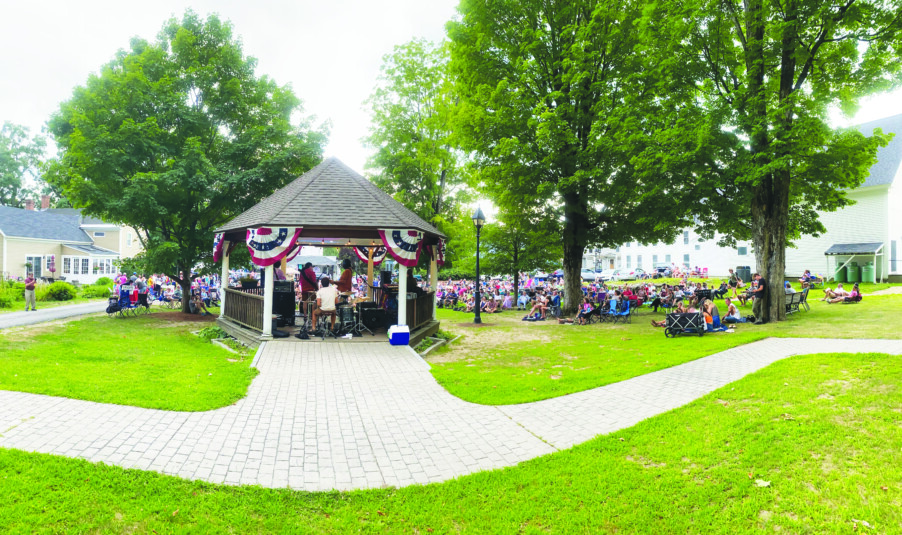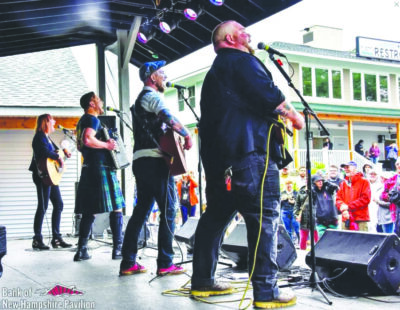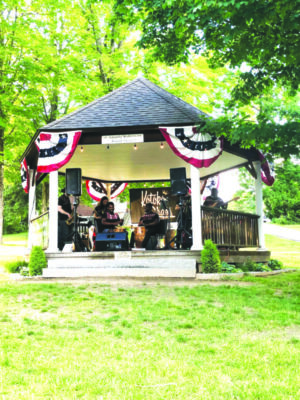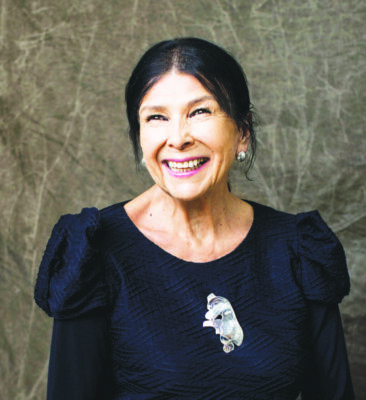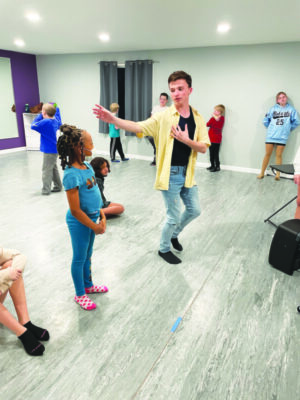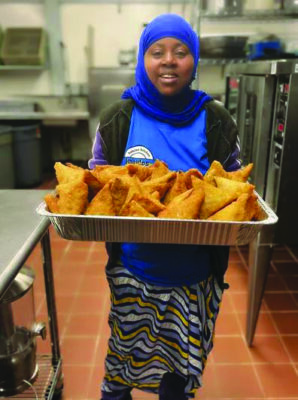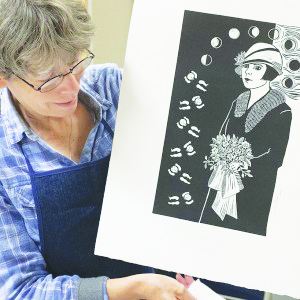Michael Witthaus checks in with comedians and bookers about the state of the local comedy scene and looks at some upcoming shows
Comedy catch-up: Jimmy Dunn’s Beach Party
What began 14 years ago as a backyard barbecue for fellow comics at Jimmy Dunn’s beach house that ended with a show has now stretched out to five nights and become a midsummer fixture on the sandy shore. But the Hampton Beach Comedy Festival, beginning Wednesday, Aug. 16 at McGuirk’s Ocean View, has remained true to its origins. It’s a party first, with admission contingent on making the host laugh.
“It’s my real comedy friends,” Dunn said by phone recently. “I’ve been working with them forever, and the show almost becomes secondary. We just have so much fun up here at the house … we hang out, then go down there and have a blast.”
Dunn has thought about letting fans eavesdrop on the offstage action, but it hasn’t happened. “I pitched it; I made a demo of it as a cartoon, trying to film our poker game,” he said. “But when you threaten to do that, a lot of the guys dummy up. They don’t want people hearing the real stuff that we’re saying.”
The gang ventures out for fried dough on the boardwalk; kayaking and surfing are popular as well. Given the prevalence of rip currents and other ocean dangers, Dunn does a safety check first. “Every time anybody gets to the house, before I take them in the water, I go, all right, what’s your swim level? Let’s see what we’re dealing with — how many life jackets I gotta put on you?”
That said, the wake of a storm is a magnet for Dunn and his daredevil buddies. One year he and Mark Riley hit the water after a coastal hurricane. “We went off the north beach, rode into a monster wave, and then we flipped; it was so big that people on the beach called the cops,” he said. “I heard from one of my cop buddies later, he said, ‘We got a call that two idiots were out in a kayak.’ I said, ‘Yeah, that was us.’”
Riley is back for this year’s festival, so the Coast Guard should be advised. Opening night has Harrison Stebbins, whose credits include Comedy Central and Dave Attel’s Insomniac Tour. He’s joined by Carolyn Plummer, who last year did her first Comics Come Home benefit at Boston’s TD Garden. Kelly MacFarland, Jimmy Cash and Ryan Gartley round things out, plus Dunn and Dave Rattigan, who are at all five shows.
Thursday includes Jim Colliton, who has a new Dry Bar Comedy special, and Mike Donovan, a Boston mainstay and published author. Dunn is looking forward to Friday’s show, which is a multigenerational affair.
“Tony V’s son Gus has turned into a great comedian,” he said. The young comic spent last winter in Southern California, working with Dunn on a television project that he’s not allowed to discuss due to the current actors and writers strikes.
“Everybody in L.A. is getting shut down and it’s tough,” he said. Dunn is in both guilds. “I support them a ton. Whatever they’re doing, they need to be paid fairly. I feel badly for professional actors and TV writers … they’re fighting for their livelihoods. I do what I can to support them. I am very lucky that I got to go back to stand-up comedy when those doors got closed out there.”
Dunn cautioned comedy fans about actors who might decide to jump into his livelihood to make ends meet.
“This is going to draw a lot of people who aren’t stand-up comics out to the comedy rooms, so buyer beware,” he said. “People that are funny on a show have writers. Standup is a different thing, man. You gotta be out doing it all the time. Anybody with a little bit of background can make the show look good, but do your homework before you go spend an evening with a comedian you never heard of.”
He points to a few comics that embody his ideal.
“Every time you see Gary Gulman, you’re going to see a whole new hour. Bob Marley’s got an unparalleled work ethic. He makes it look so easy on stage, but he works harder than anybody I know. I was talking to Juston McKinney a few weeks back, same deal. These are guys that every time you see them it’s a new thing.”
To that end, Dunn has some new material.
“My uncle used to be a bookie. That’s how I learned to gamble at a young age. But now you can bet pretty much anywhere legally. So one of my favorite new bits explores those two different worlds and what Uncle Sully would see if he walked into Draft Kings today. He ran his book out of a sandwich shop in Beverly. Guys would come in and buy a cheese steak and then give him $609. I’d be sitting there going, ‘I think he overpaid you, Uncle Sully.’”
While in California, Dunn encountered another new normal, the many marijuana stores that are now open. He’s less focused on weed’s new ubiquity than on whoever’s in charge of branding. “I will not do business with anyone that uses a ‘Z’ as a plural,” he said. “That means that someone already beat them to the S, and they’re hacks. Hair salons do it all the time. Now all the weed places have a Z as a plural too. It seems like every weed pun has been written, trademarked and put on a sign. I know they think it’s funny because they’re high, but these are bad puns.”
Hampton Beach Comedy Festival
When: Wednesday, Aug. 16, through Sunday, Aug. 20, 8 p.m.
Where: McGuirk’s Ocean View Hotel, 95 Ocean Boulevard, Hampton Beach
Tickets: $20 per show at eventbrite.com
Lineup: Aug. 16 Carolyn Plummer, Kelly MacFarland, Jimmy Cash, Ryan Gartley, Harrison Stebbins; Aug. 17 Mike Donovan, James Dorsey, Ken Rogerson, Paul Nardizzi, Jim Colliton; Aug. 18 Tony V, Gus V, Steve Scarfo, Jason Merrill, Tony Moschetto; Aug. 19 Karen Morgan, Will Noonan, Casey Crawford, Dan Miller, Chris Zito; Aug. 20 Andrew Della Volpe, Mitch Stinson, Mark Riley, Steve Bjork, Dan Crohn. Jimmy Dunn and Dave Rattigan appear all nights.
Female forward: Mother of a Comedy Show

Like the Hampton Beach Comedy Festival, camaraderie is the guiding force for three women performing Mother of a Comedy Show, an occasional event happening Friday, Aug.18, at Nashua Center for the Arts and Saturday, Sept. 23, at Laconia’s Colonial Theatre. Its slate of standups ― Kelly MacFarland, Kerri Louise and Christine Hurley ― have equal star power; each is a headliner.
For the shows, MacFarland opens and Hurley closes, which suits Kerri Louise just fine.
“The middle spot is the sweet spot,” Louise said by phone recently. “Everybody’s warmed up, no one’s coming in late, they’re all set up. I hit it out of the park and then go home … they’ve laughed for a whole hour nonstop and then Christine goes up, but she kills it. We’ve done it for so many years now and it’s just like clockwork.”
The fully female lineup is unique in the comedy world, she continued. “Usually, you don’t ever work with other women. I’m always the one woman on the show, the token woman, and when I get to go and work with these girls, it is so fun. We just bring energy and excitement; we’re like little kids.”
Audiences do tend to be more female. “It depends on the market and what time of year we’re in,” Kerri Louise said. “In September, it’s mostly women. The kids get back in school, they’re out and about and they can come to shows.” Jokes lean in that direction as well; one of Kerri Louise’s best deals with something she calls a “period bump” being confused with early pregnancy.
The three don’t need a target audience for their material to land, though. There’s a frustratingly enduring notion that female comics aren’t as funny as men, but it’s more self-fulfilling prophecy than anything supported by data. In Kerri Louise’s view, the situation is improving, but the battle is far from over.
“We’re getting better, but we’re not past it,” she said. “I think there’s just not enough of us and that’s why. Bookers usually are men and they’re afraid to headline women because they feel the numbers aren’t going to be there, but men are so dumb. Women decide what they’re doing for the weekend, and they tell their husbands. ‘We’re going to go to a comedy show.’ Why not headline a woman?”
The success of The Marvelous Mrs. Maisel, Amazon’s popular show about a housewife stumbling into standup, may have a halo effect, she agreed, but she offered a caveat. “They can’t be it if they can’t see it, so I think it helped for younger women to glorify being a comedian,” she said. “I love the show. I love the outfits. I love the ’50s. Here’s what I didn’t like about it ― it’s not easy. They make it look that way; I mean, she was a mother.”
Her husband is also a comedian. She and Tom Cotter have three sons, including a set of twins. One night she told a crowd that her twins were outside in the car while she did her set. “The reason why that’s a joke is it was true,” she said. “I didn’t have time to drop my kids off because I was in major traffic…. I did have someone in the car watching them, but I ran up on stage and I’m like, ‘Hey, how are you? I have twins in the car,’ and it got a huge laugh. I use it all the time, and now they’re 21.”
Another time, she played Atlantic City for a week. Through the casino she was working at, she hired an overpriced babysitter, who was unavailable at the last minute. “Then they got this crack addict,” she said. The show is minutes from starting and she’s telling her new care provider to please leave her sons in the bathroom in their pack-and-play for the 15 minutes she needs to open. She comes back and the kids are up and jumping on the bed, watching a movie that the babysitter has purchased.
Here’s the problem: Kerri Louise has another set to do, and for the moment this ne’er-do-well is her sole child care option.
“The only saving grace is I’m in a casino and there are cameras everywhere,” she continues. “I ran downstairs, and I said to the security guy, ‘If a woman comes with two babies, they are mine, stop her.’ I don’t know how I got through my set. I just put it on autopilot, ran back and said, ‘You’re fired.’ It wasn’t even her fault but whatever. I called the agency and then the next day I had to look for another babysitter situation. So that’s my real Marvelous Mrs. Maisel story.”
Booker report: Big rooms are back (mostly)

Beginning with booking a 1989 Lenny Clarke show in the back room of a Nashua gym, Jim Roach has been a force in New England’s comedy scene. His involvement began earlier; Roach worked a Henny Youngman show in 1984. He’s had a hand in appearances including George Carlin, Jay Leno, Sam Kinison, Denis Leary and an early ’90s Jerry Seinfeld/Adam Sandler double bill in Lowell, Mass.
His “all-time best” night was comedy legend Don Rickles’ show at Manchester’s Palace Theatre in 2006, when Rickles, his musical director and his road manager — who had a similar job with Frank Sinatra — took him to dinner. The evening produced some great stories.
Roach still books comedy at the Palace, along with a long list of opera houses and showcase rooms in New Hampshire. He’s got upcoming shows at Nashua’s new Center for the Arts, the Capitol Center in Concord, the Lebanon Opera House and both Colonial Theatres, in Keene and Laconia.
So Jim Roach is a good person to take the pulse of professional comedy. A recent phone interview began at a familiar point, the transition from socially distanced events to something approaching normal: “Two summers ago, when the Colonial in Laconia opened up with Bob Marley, we did seven shows and we sold them all out. That was when we felt like, OK, we’re on the right side of this.”
Demand was met with an onslaught that included some subpar efforts.
“Everybody was doing comedy shows, little bars and little places,” Roach said. “Not all of it was great … people that weren’t ready to do even those small rooms were doing it, but it gave them stage time and that’s the most important thing for any comedian.”
Overall, Roach remains cautiously optimistic.
“It really has jumped up quite a bit,” he said. “I don’t know if we’re exactly back where we were before the pandemic where everybody’s feeling like coming out, but we’re very close and I think it’s going to continue to grow over the next couple of years.”
Time-worn patterns with his client comics Bob Marley, Juston McKinney and Jimmy Dunn haven’t fully returned. “I like to be on a calendar circuit; every November Marley is at the Capitol Center, every spring he’s at the Palace. Then we’ll usually do the spring in Keene and the fall in Lebanon,” Roach said. “We’re not back in the routine yet.”
On the other hand, he said, “There’s also a lot of rooms that took time to do work on the venues, like the Lebanon Opera House is in their second phase.” Keene added its Showroom, to complement midsize spots like Manchester’s Rex Theatre and Bank of New Hampshire Stage in Concord; Lebanon Opera House is reportedly working on a second room.
“It really does help; when you’re booking big national artists, agents love it when you can book their smaller acts,” Roach said. “I love working with a lot of young comics, and I’ve worked with a bunch of young kids recently.”
He names Kathy Ferris, Emily Ruskowski, Carolyn Cook and Kristy Kielbasinski as some of his recent favorites. The latter is a working mother of three who published her first children’s book in 2022.
“Nick Hoff is a national comedian, he was at the Rex for me, what a great kid. He’s on the road with his family, his wife and three kids. They’re touring the country trying to do as many states as possible this summer. What a cool thing — they’re experiencing America, he’s getting to work and they’re doing it together.”
Justin Hoff is another up and comer, a mid-30s comic Roach booked to open for Marley’s recent run of shows at Blue Ocean Music Hall in Salisbury Beach, Mass.
“There’s a lot of good stuff coming out and there are so many tools now for comics to get their message out there,” he said.
Roach is also pleased with the response to the all-female, all-headliner Mother of a Comedy Show. “I love the Mothers, getting and putting that together with them and working with them closely on it,” he said. “However, I will tell you than when I go to the show, I can’t get a word in edgewise, because they’re all brilliant and extremely funny, and all they want to do is torture me.”
On balance, “I think comedy is in a good place right now,” Roach said, adding that a plethora of venues may be a double-edged sword, but it’s good that aspirants have time and space to experiment and learn.
“They need to figure out who they are on stage, what their particular brand of comedy is,” he said. “Listen, we’re all messed up … when you go on stage, you’re able to talk about stuff that’s real in your life. Maybe exaggerate it, build it up a little bit, but if you’re coming from a place of love in your heart and the craziness that’s in your life, people in the audience are going to get it, they’re going to understand it — because we’re all messed up.”
The fan: Alt comedy has a new producer

When it debuted as Laugh Free or Die 15 years ago in the back room of Shaskeen Pub in Manchester, weekly standup was an open mic affair. When cofounder Nick Lavallee and Dave Carter took it over in 2013, it evolved into an alt comedy hub, with national performers like W. Kamau Bell, Kyle Kinane, Dan Soder and Emma Willmann often stopping by. Local comics like Jay Chanoine and Drew Dunn parlayed early open mic success at the Shaskeen onto bigger stages.
Geneva Gonzales began attending shows there around 2016 and quickly became a regular. As live comedy returned after the pandemic, Lavallee announced he was leaving his role as a comedy producer, along with Carter. A worried Gonzales begged him to not let shows end permanently. His response surprised her.
“He was like, ‘Why don’t you run it?’” she recalled while sitting outside the Shaskeen, where headliner Ryan Donahue and three other comics would perform later. “I was like, OK, I will.’” Her company, Ruby Room Comedy, produced its first show on Sept. 8, 2021, and has been operating steadily since.
It turned out that Gonzales was just getting started as a comedy producer.
Last year she was approached by Don’t Tell Comedy, a national effort that sponsors pop-up shows at mystery locations, to be its lead producer in New Hampshire. More recently she began running weekly comedy shows at BLEND.603, a Portsmouth art gallery. Her new goal is “balancing those three rooms and getting them to work together,” she said.
Gonzales sounds like a seasoned pro as she discusses luring comics from New York City with the promise of routing them to gigs in multiple rooms, but seven years ago she hadn’t even seen live standup.
“I just heard people at work talking about it, and I wanted to see a comedy show,” she said about venturing to the Shaskeen that first time. “I always loved SNL, Mad TV…. When I came to this one, the level of talent opened my eyes to a whole world that I went head over heels into.”
Among the shows Gonzales has booked at the Shaskeen are Eddie Pepitone, Mary Mack, Daniel Simonsen, Mo Mussa, Shaun Murphy, Jenny Zigrino and Andrew Della Volpe. Many have performed multiple times, and the Irish pub’s beloved back room hasn’t lost a step in the transition. It continues to offer a brand of national comedy unlike anywhere else in the region.
Most unique is Don’t Tell Comedy and its unconventional way of luring fans to shows. It’s reminiscent of the movie Nick and Norah’s Infinite Playlist, where a couple search for a private location where a band named Where’s Fluffy is playing, but it’s a bit easier than that, Gonzales said.
The next one happens Friday, Aug. 11, an early and late show somewhere in Portsmouth ($25 at donttellcomedy.com), and the 21+ event is BYOB. “You buy a ticket, but you don’t know who the comics are until the day of show, when you get an email with the location. We’ve done the Bookery, the Currier, yoga studios, art spaces, usually places where you wouldn’t expect to have a comedy show, and it could be a huge comic from L.A. or a local guy.”
As far as her favorite comedians, Dunn and Chanoine are high on the list, but Gonzales is hesitant to name a top moment in her two years as a producer. It’s electricity that’s happened many times.
“When you get those loud moments of laughter, you feel the energy shift in a room of people that are enjoying themselves and letting themselves go,” she said. “There’s no control sometimes when you laugh and there’s that wave … that’s the best thing. I crave it; it’s dopamine for me.”
Gonzales tries to keep an open mind with her booking. She tries to offer enough variety to please everyone, not just herself. She does try to be inclusive. “As a Hispanic female in comedy it’s been really important to me to promote diversity in my shows,” she said. “In the past we’ve celebrated different cultures with shows that include all Hispanic and all Asian line-ups and I hope to do more in the future.”
She’s also part of a group that runs monthly mental health meetups. These are “conversations about the importance of maintaining mental health and supporting each other in the New England comedy community,” she said. “In past meetings we’ve had guest speakers from NAMI, and guided meditations.”
Through it all Gonzales is still the same fan who showed up at the Shaskeen back when looking for laughter.
“Honestly, I enjoy comedy,” she said. “I’m putting on shows that I want to see, but I try and make sure that I’m getting well-rounded talent. I may not find all of them funny, but I know other people will find them funny. Ultimately I want to put on a good show. As a fan, I have that perspective where I’m playing the politics that a comedian would need to play … then at the end of the day, I sit down and watch the show and I’m ready to laugh.”
Just a joke?: cancel or consequence
There’s a growing sentiment among fans and some purveyors of comedy that goes a bit like this: “Almost anything a comic says on stage these days might get them canceled.” Most comedians get it, though — the trick is don’t be more mean than funny.
Comedy veteran and national touring standup Steve Hofstetter, who will perform in October at Nashua’s Center for the Arts, has a formula for whether a bit has crossed the line. “Jokes need to be more than fifty-one percent funny than whatever else they are, or it’s not a joke,” he said. “If there’s a joke about race that is less than fifty-one percent funny, it’s not a joke at all, it’s just a racist thing…. If something is so funny that it eclipses the subject matter that a comic is talking about, that’s what makes it a joke. If something is a little bit funny, but overwhelmingly something else, then the funny of it doesn’t matter at all.”
Two of the comics interviewed for this story offered their takes on how far is too far.
Jimmy Dunn: “There are certain things that no matter who you are you’re not going to make it funny, but people will try to make it funny. The No. 1 rule is it must be funny. Look, people are not coming out to be challenged or for you to insult their sensibilities. They’re just coming out for a good time. My attitude is usually I can write a joke that would have a point and would piss half the audience off. I have no interest in doing that. My job is to make everybody laugh, have everybody leave and have a good time. I don’t want controversy. That’s not what I do. There’s some great comics that do that that I follow and some of my friends have made great livings being the ‘I can’t believe he said that’ guy, you know? Not what I want to do. I want the husband and wife to have a great time and have a couple of drinks. I want the guy who owns the club to hand me a big bag of money and say, ‘Thanks for coming in. We’ll see you next week.’”
Kerri Louise: “I do think there is a line, but mine is so far north it’s unbelievable. The line has come down so far where you can’t even talk about a black crayon and someone’s gonna be like, ‘Wait, that’s racist.’ That’s where I get so angry and sad for every comedian. It does make you work harder; it makes you think, but it shouldn’t. Years ago, there was a line. You’re not going to be mean but you’re going to make fun of what everybody else makes fun of. When you make fun of a stereotype, everybody can get the joke at the same time. If no one has that common knowledge, how can we make fun? We’re all making fun and having a good time, so relax. Kathy Griffin, I read her book, and she’s like, ‘Find your audience, because I know I’m not for everybody.’ It’s true. But what’s happening is people are seeking you out just to cancel you. I can only wish to be canceled; that means I’m popular. But no one’s canceled me right now, so I don’t have to worry about it.”
Steve Hofstetter, again: “I happen to think that cancel culture doesn’t exist. I cannot name a single comedian who has been canceled. I can name some who have been fired. I can name some who have been arrested. But anyone that someone holds up as a canceled icon, like Louis C.K.? He hosted SNL; that doesn’t sound canceled. Shane Gillis was canceled? No, he was fired from SNL. But now he’s playing venues twice the size that he was playing before that happened. There’s no one that’s gotten canceled, because the entertainment industry is direct to consumer these days. They determine whether or not you work. So the people who are worried about getting canceled or complaining that they’ve been canceled are either liars or people who don’t want to bother writing a new joke.”
Comedy shows
Chunky’s Cinema Pub in Manchester
707 Huse Road, Manchester; chunkys.com. Most shows start at 8:30 p.m. Ticket prices vary.
Friday, Aug. 11 Lenny Clarke
Saturday, Aug. 12 Harrison Stebbins
Saturday, Aug. 19 Jody Sloane
Saturday, Aug. 26 Phillip Anthony
Saturday, Sept. 2 Tim McKeever
Saturday, Sept. 9 Brad Mastrangelo
Saturday, Sept. 16 Steve Bjork
Saturday, Sept. 23 Chris D
Saturday, Sept. 30 Kyle Crawford
Friday, Oct. 6 and Saturday, Oct. 7 Greg Fitzsimmons
Saturday, Oct. 14 Marty Caproni
Saturday, Oct. 21 Pat Napoli
Sat., Oct. 28 Harrison Stebbins
Don’t Tell Comedy
Donttellcomedy.com. Shows are at locations and with comedians announced after you obtain tickets. Upcoming shows include Aug. 11, Aug. 19 and Aug. 25, with 7 and 9 p.m. shows in a Portsmouth location.
Palace Theatre
80 Hanover St., Manchester; palacetheatre.org
Saturday, Aug. 12, 7:30 p.m., Kevin Pollak (in conjunction with the Manchester International Film Festival)
Sunday, Sept. 17, 7 p.m. Colin & Brad: Scared Scriptless
Saturday, Oct. 7, 5 and 8 p.m. Juston McKinney
Tupelo Music Hall
10 A St., Derry; tupelomusichall.com
Saturday, Aug. 12, 8 p.m. Lenny Clarke
Friday, Aug. 25, 8 p.m. Tupelo Night of Comedy: Tony V, Sean Sullivan and Dave Decker
Saturday, Sept. 23, 8 p.m. Paula Poundstone
Saturday, Oct. 7, 8 p.m. Tupelo Night of Comedy: Paul Gilligan, Paul Landwehr
Thursday, Nov. 2, 8 p.m. Brad Mastrangelo, Steve Bjork and Kennedy Richard (NH Chiefs of Police Fundraiser)
Murphy’s Taproom, Manchester
494 Elm St., Manchester; scampscomedy.com/shows. Shows are Saturdays at 8 p.m. See website for tickets.
Aug. 12 Janet McNamara
Aug. 19 & Aug. 26 TBA
Sept. 2 Dave Rattigan
Headliners Manchester
At the DoubleTree Hilton Manchester (700 Elm St. in downtown Manchester); headlinersnh.com. Tickets cost $20. Saturday shows start at 8:30 p.m. Ticket sales at the door begin at 6 p.m.
Aug. 12 Jody Sloane
Aug. 19 Dan Crohn
Aug. 26 Steve Bjork
Sept. 2 Chris D
Sept. 9 Amy Tee
Sept. 16 Skip Daniels
Sept. 23 Kyle Crawford
Sept. 30 Cory Gee
Oct. 7 Tim McKeever
Oct. 14 Amy Tee
Oct. 21 Brad Mastrangelo
Oct. 28 James Dorsey
BLEND.603 Gallery
82 Fleet St., Portsmouth; blend603.com. Tickets start at $20.
Saturday, Aug. 12, 8 p.m. Jason Cordova
Friday, Aug.18, 8 p.m. Gary Petersen
Saturday, Aug. 26, 8 p.m. BLEND.comedy TBA
Shaskeen Pub
909 Elm St. in Manchester; shaskeenirishpub.com. Comedy by Ruby Room Comedy, rubyroomcomedy.com. Find them on EventBrite for tickets to Wednesday, 9 p.m., shows. Tickets start at $10.
Aug. 16 Ashton Womack
Aug. 23 Matt Lopes
Aug. 30 Jon Tillson
Colonial Theatre of Laconia
609 Main St., Laconia; coloniallaconia.com
Thursday, Aug. 17, 8 p.m. Tony V, Steve Scarfo and Ryan Gartley (Franklin Animal Shelter Comedy Night)
Saturday, Sept. 23, 8 p.m. Mother of a Comedy Show
Thursday, Oct. 12, 8 p.m. Daniel Sloss
Friday, Dec. 8, 7:30 p.m. Brad Upton
Nashua Center for the Arts
201 Main St., Nashua; nashuacenterforthearts.com, 800-657-8774.
Friday, Aug. 18, 8 p.m. Mother of a Comedy Show
Saturday, Oct. 7, 8 p.m. Steve Hofstetter
Saturday, Oct. 18, 7 p.m., Chelcie Lynn
Rex Theatre
23 Amherst St., Manchester; palacetheatre.org. Most Friday Night at the Rex shows start at 7:30 p.m. and ticket prices are generally $25.
Aug. 18 Al Park
Sept. 15 Tony V. and Friends
Sept. 22 Brian Glowacki and Friends
Sept. 29 Robert Dubac’s The Book of Moron
Bank of NH Stage
16 S. Main St., Concord; ccanh.com
Saturday, Aug. 26, at 8 p.m. Jimmy Dunn
Music Hall
The Music Hall Historic Theater is at 28 Chestnut St., Portsmouth; the Lounge is at 131 Congress St., Portsmouth. themusichall.org.
Sunday, Aug. 27, 8 p.m. Jen Kober (Lounge)
Saturday, Sept. 2, 8:30 p.m. Nick Callas (Lounge)
Thursday, Sept. 21, 7:30 p.m. Pinky Patel (Theater)
Friday, Sept. 29, at 6 and 8:30 p.m. and Saturday, Sept. 30, at 6 and 9 p.m. Bassem Yousef (Lounge)
Friday, Oct. 6, 7:30 p.m. Michael Carbonaro (theater)
Wednesday, Oct. 18, 7 p.m. Howie Mandel (Theater)
Saturday, Nov. 4, 6 and 8:30 p.m. David Koechner: The Office Trivia with “Todd Packer” (Lounge)
Thursday, Nov. 9, 6 and 8:30 p.m. Ben Bailey (Lounge)
Saturday, Nov. 11, 6 and 8:30 p.m., Brian Glowaki (Lounge)
Tuesday, Dec. 26, at 7 p.m.; Wednesday, Dec. 27, at 7 p.m., and Thursday, Dec. 28, at 8 p.m. Juston McKinney’s Comedy Year in Review (Theater)
Chunky’s Cinema Pub in Nashua
151 Coliseum Ave., Nashua; Chunkys.com. See website for Saturday show times and ticket prices.
Sept. 2 Al Ghanekar
Sept. 9 Mike Hanley
Sept. 16 Peter Lui
Sept. 23 Brian Beaudion
Sept. 30 Tim McKeever
Oct. 7 Steve Bjork
Oct. 14 Ace Aceto
Oct. 21 Kyle Crawford
Oct. 28 Brad Mastrangelo
Amato Center
56 Mont Vernon St., Milford. See bmarley.com for tickets.
Friday, Sept. 15, 7:30 p.m. Bob Marley
Capitol Center for the Arts
Chubb Theatre, 44 S. Main St., Concord; ccanh.com
Saturday, Sept.16, 8 p.m. Demetri Martin
Thursday, Sept. 21, 7:30 p.m. Jonathan Van Ness
Saturday, Sept. 23, 8 p.m. Nurse Blake
Sunday, Oct.15, 7 p.m. Penn & Teller Present: The Foolers
Friday, Nov. 3, and Saturday, Nov. 4, 8 p.m. Bob Marley
SNHU Arena
555 Elm St., Manchester; snhuarena.com
Saturday, Sept. 30, 7 p.m. Bill Burr
Murphy’s Taproom, Bedford
393 Route 101, Bedford
Sunday, Oct. 29 Lenny Clarke
Featured photo: Jimmy Dunn. Courtesy photo.











